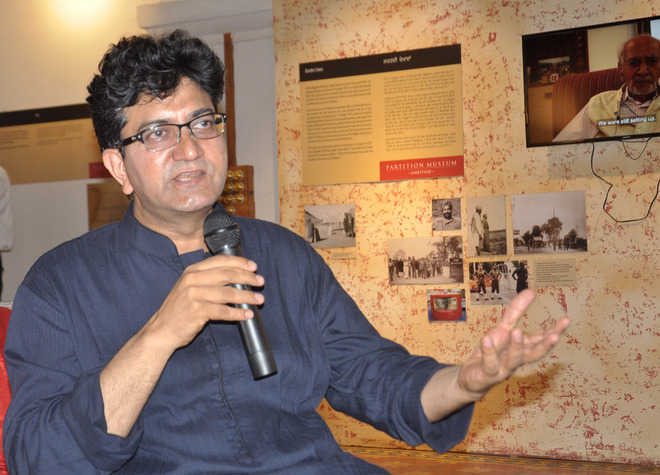Neha Saini
Tribune News Service
Amritsar, May 27
Calling the Partition Museum a beating heart full of history, Prasoon Joshi, the Padma Shree writer and chairperson of Censor Board of film Certification, has stressed on building it as a bridge connecting past, present and future generations.
Speaking at a poetry session held by the Partition Museum under the aegis of the Arts and Literature Festival of Amritsar (ALFA), in collaboration with Phulkari (a social organisation) on Saturday, Joshi said he was quite amazed at the way the concept came about. “It’s connected to our collective conscience, emotions and the more people contribute towards it the more fleshed out it would be. It has to be left to the individual, what one achieves through it or feels when you visit. It is dedicated to hope.”
A noted lyricist and a poet, Joshi also recited some of his popular songs and poetry, remembering fondly his experience of working on Bhaag Milkha Bhaag. “The film had to depict Milkha Singh’s struggle to overcome his experiences during the partition and building his life again. To bring that aspect of resilience and hope despite many challenges people faced during the time, is what I intended to achieve,” he said.
Talking about his role as the chief of the censor board, his trysts with controversies right from Padmavat to Veere Di Wedding, Joshi said that everything had to be viewed in perspective. “Padmavat was a learning experience in many ways. Creativity and responsibility go hand in hand. Today everyone has a platform and so an opinion to voice. When you have all these opinions, you have to consider them, irrespective of your own resonance with them.”
He did mention that the society is changing, times are changing and there needs to be a discussion and debate on setting up some sort of guidelines that could prevent such conflicts in future. He shared some of his personal notes on working on films and how his poetry has changed from being subjective to being direct, over the years.
Kishwer Desai, well known author and museum’s chairperson, said the museum is significant as it preserves our history through live documentation. “The museum is dedicated to the millions of refugees who were uprooted overnight, and to their spirit and resilience in rebuilding their lives.”
Unlock Exclusive Insights with The Tribune Premium
Take your experience further with Premium access.
Thought-provoking Opinions, Expert Analysis, In-depth Insights and other Member Only Benefits
Already a Member? Sign In Now











